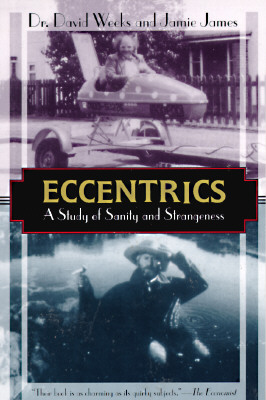

| ECCENTRICS | Rating: 5.0 High |
|||
| A Study of Sanity and Strangeness Dr. David Weeks & Jamie James New York: Villard, 1995 |
||||
| ISBN-13 978-0-394-56565-1 | ||||
| ISBN 0-394-56565-7 | 277p. | HC/BWI | $23.00 | |
Here's an outstanding example of literary eccentricity.1 It is found on pages 45-47 of Eccentrics.
| "I could truly have enlarged this discourse with a choicer variety of phrase, and made it overflow the field of the reader's understanding with an inundation of greater eloquence; and that one way, tropologetically, by metonymical, ironical, metaphorical, and synecdochical instruments of elocution, in all their several kinds, artificially effected, according to the nature of the subject, with emphatical expressions in things of greater concernment, with catachrestical in matters of meaner moment; attended on each side respectively with an epiplectic and exegetic modification; with hyperbolical, either epitatically or hypocoristically, as the purpose required to be elated or extenuated, with qualifying metaphors, and accompanied by apostrophes; and lastly, with allegories of all sorts, whether apologal, affabulatory, parabolary, aenigmatic, or paraemial. And on the other part, schematologetically adorning the proposed theme with the most especial and chief flowers of the garden of rhetoric and omitting no figure either of diction or sentence, that might contribute to the ear's enchantment, or persuasion of the hearer. I could have introduced, in case of obscurity, synonymal, exargastic, palilogetic elucidations; for sweetness of phrase, antimetathetic commutations of epithets; for the vehement excitation of a matter, exclamation in the front and epiphonemas in the rear. I could have used, for the promptlier stirring up of passion, apostrophal and prosopopoeial diversions; and, for the appeasing and settling of them, some epanorthotic revocations, and aposiopetic restraints. I could have inserted dialogisms, displaying their interrogatory part with communicatively psymatic and sustenative flourishes; or proleptically, with the refutative schemes of anticipation and subjection, and that part which concerns the responsary, with the figures of permission and concession. Speeches extending a matter beyond what is, auxetically, digressively, transitiously, by ratiocination, aetiology, circumlocution, and other ways, I could have made use of; as likewise with words diminishing the worth of a thing; tapinotically, periphrastically, by rejection, translation, and other means, I could have served myself." |
The above comes from The Jewel, a panegyric to the nation of Scotland written by Sir Thomas Urquhart (1611-1660). Urquhart was renowned for his translation of Rabelais. Weeks calls his prose "the intoxicated apogee of the baroque in English". The passage quoted actually is an apology by Urquhart to the reader for writing with relative meagerness of style, compared to what he might have produced. It must stand, today, as an acid test of recititative prowess, vocabularical perspicacity, or word-processor-dictionary comprehensiveness.

 To contact Chris Winter, send email to this address.
To contact Chris Winter, send email to this address.